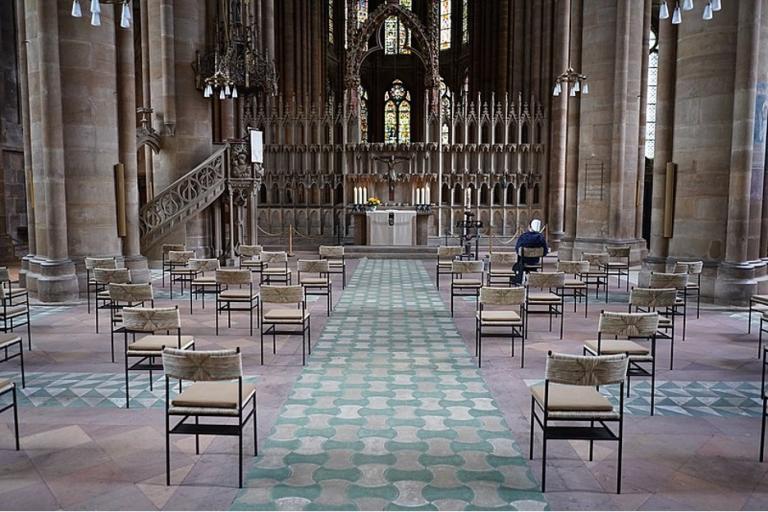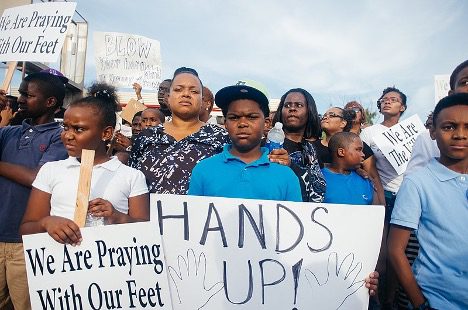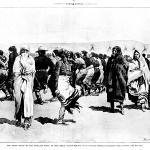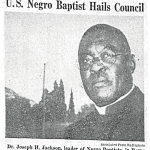A series of overlapping internal crises and a steep decline in church membership over the past decade has led to much handwringing in American Evangelicalism. Sexual abuse cover-ups, the public fall of several megachurch pastors and controversial decisions regarding COVID-19 have grabbed headlines, dominated Twitter feeds, and resulted in a broad feeling of burn-out among American pastors. To make matters worse, these pressing crises took place against the backdrop of a precipitous decline in the percentage of Americans who call themselves Christian.
Several journalists have identified how racial divides contributed to disenchantment in American Evangelicalism. Campbell Robertson coined the phrase “Quiet Exodus” in a 2018 New York Times article to describe a slow and subtle movement of Black Christians out of majority White evangelical churches in the context of a national reckoning with police brutality and the presidency of Donald Trump. Others followed up and extended this analysis in light of the COVID-19 pandemic, the murder of George Floyd and public debate over critical race theory.
Much of the Quiet Exodus commentary has focused on men, exhibiting the reality that men dominate leadership positions in evangelical churches and denominations. It also reflects a longer tradition in the historical treatment of American religion, which centers male theologians and pastors. Given the fact that women have historically made up the majority of religious practitioners in the United States, a male-centric focus in examinations of a Black exodus from White evangelical institutions leaves an important segment of Christians left out of the conversation.
Sociologist of religion Cheryl Townsend Gilkes contends that, without women, the church could not exist.[1]Historian Ann Braude suggests that narratives of American religion not only expand, but change when women’s experiences are the center of focus.[2] Moreover, womanist theologians have long contended that Black women’s lived experience at the intersection of sexism, racism and classism provides them with “an epistemological privilege of the oppressed,” that can offer a prophetic vantage point into injustices both in the church and the world.[3] Centering Black women’s account of their own exit from White evangelicalism not only changes the Quiet Exodus narrative but also sheds light on how the American church might respond.
An investigation of a small set of Black Christian women’s blog posts between 2010 and 2020 suggests that Black women did not leave White evangelical institutions quietly. By the early 2010s, online blogs and comments sections had become a primary medium for public conversation, available to the general populace without the constraints and obstacles inherent to formal publishing.[4] This medium also facilitated a bottom-up approach to social justice organizing, long advocated by black feminists.[5]
Austin Channing Brown maintained a self-titled blog from 2013 to 2019 that provides insight into how Black Christian women in White evangelical spaces came to the decision to leave. From 2011 to 2014, Brown led racial reconciliation efforts at Willow Creek Community Church, a predominantly White mega-church in the Chicago suburbs. In 2014, she began working as Multicultural Liaison at Calvin College, a majority-white Christian college in Grand Rapids, Michigan.
Brown used her blog to publicly respond to the race-based violence that dominated the news in the 2010s. For instance, in a June 2015 blog post written the day after the murder of nine parishioners in Emmanuel AME Church at the hands of a White supremacist, Brown expressed fear that American churches would fail to implement any significant changes regarding race, even in light of the shooting. Less than three months later, Brown credited the Ferguson protests for heightening her own political and historical consciousness by causing her to see the on-going impact of economic oppression, military weaponry and police brutality on Black communities.
Beyond reflecting on national events, Brown used her public writing to teach White readers how they could take steps to address racism in their own churches. In a March 2015 post, she enumerated ten challenges that women of color face in leadership and recommend ways that readers could support them. In light of the Ferguson protests, she calledWhite readers to risk the loss of old thinking habits and the comfort of dominant spaces and implored them to sit under the teachings of Black preachers.[6] In 2018, Brown published a best-selling memoir that reflected on the role of White evangelicalism in perpetuating racial hostility and invited readers to recognize God’s liberative work through the lens of Blackness. By 2020, Brown had left Calvin and become a full time writer and speaker.
Like Brown, Ekemini Uwan, a public theologian and graduate of Westminster Theological Seminary, maintained a blog from 2013 to 2019 called Sistamatic Theology. In a 2018 post, Ekemini Uwan described a common and complex dynamic for Black women in majority White church spaces who experience hypervisibility in regard to their bodies, mannerisms, and speech that, ironically, results in a feeling of invisibility as their individuality is subsumed by the angry Black woman trope. Uwan also noted the destructive effects of extrabiblical definitions of manhood and womanhood in White evangelical spaces and their connection to a feeling of invisibility among Black women who do not conform to the White, middle-class profile of a “biblical woman.”
Uwan went beyond describing challenges Black women face inside of White evangelical institutions and called for specific action. She recommended that churches implement decolonized discipleship by affirming the God-given skin, hair, body and culture of their parishioners of color. After graduating from Westminster in 2016, Uwan joined forces with her friends Christina Edmondson and Michelle Higgins to facilitated a restorative community through their podcast, Truth’s Table, which they founded in 2017 “for the nourishment of black women.”
Dr. Chanequa Walker-Barnes, a professor of practical theology at Columbia Theological Seminary, served for much of the 2010s as a speaker and leader for the Christian Community Development Association, a left-leaning evangelical network founded by John Perkins. In a 2015 post on her blog, Dr. Chanequa’s Musings, Walker-Barnes reflected on her experience within White evangelicalism, which required constant shape-shifting and flattening. She poignantly described being a Black woman in an evangelical social justice organization as “akin to being a three-dimensional creature trying to live in a two-dimensional world.” Soon after President Trump was inaugurated in 2017, Dr. Walker-Barnes left the White-majority church where she had served on staff, declaring that her attempt to “live this vision of beloved community with a diverse group of people” had not worked.
In a similar fashion to both Brown and Uwan, Walker-Barnes made efforts to both minister to other Black women in evangelical spaces and use her experience to create resources for the wider Christian community. She advocated for and led a retreat exclusively for women of color inside the Christian Community Development Association in 2015. Four years later, she published a book through an evangelical press that offered a womanist perspective for racial reconciliation.
Taken together, the writing and action of these three bloggers indicate that Black Christian women did not leave evangelicalism quietly, but rather documented their exodus stories, recounting the duplicating effects of their race and gender in their experiences of isolation and fatigue within White evangelical institutions. These authors told their stories with a purpose, often inspired by their faith commitments, in order to instruct and connect with one another while also offering a prophetic word to the institutions they left behind.
In light of the significant decline in White American affiliation with Christianity over the past decade, it is worth noting that these Black women bloggers did not leave the faith tradition altogether after exiting White evangelical institutions. Precisely because American evangelicalism is facing a crisis involving issues of race, gender, sexuality and power, Black women have particular insights to offer based on their embodied daily experiences at the intersection of these various constructs.[7]
So, for American Christian leaders who are looking for wisdom and hope for their tradition’s future: pay attention and listen to Black women – they are talking.
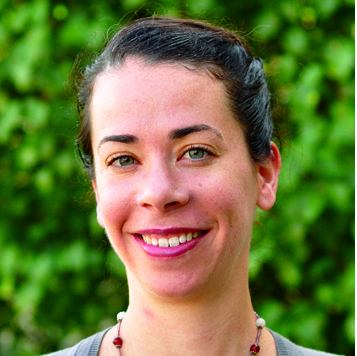 Today we have the pleasure of welcoming a guest contribution from Leslie Garrote to the Anxious Bench. Garrote is a Ph.D. student in the Historical Studies division of Baylor’s Religion Department. Her scholarship focuses on issues of race and gender in American Evangelicalism at the turn of the 21st century, specifically in the racial reconciliation movement. Leslie also serves as an Editorial Intern with the Westminster John Knox Press and the Assistant Managing Editor for the Journal of Church and State.
Today we have the pleasure of welcoming a guest contribution from Leslie Garrote to the Anxious Bench. Garrote is a Ph.D. student in the Historical Studies division of Baylor’s Religion Department. Her scholarship focuses on issues of race and gender in American Evangelicalism at the turn of the 21st century, specifically in the racial reconciliation movement. Leslie also serves as an Editorial Intern with the Westminster John Knox Press and the Assistant Managing Editor for the Journal of Church and State.
[1] Cheryl A. Kirk-Duggan, “Womanist Theology as a Corrective to African American Theology,” in The Oxford Handbook of African American Theology, ed. Anthony B. Pinn and Katie G. Cannon (Oxford University Press, 2014), 0, https://doi.org/10.1093/oxfordhb/9780199755653.013.0019.
[2] Anne Braude, “Women’s History Is American Religious History,” in Retelling U.S. Religious History, ed. Thomas A. Tweed, ACLS Humanities E-Book (Series) (Berkeley, Calif: University of California Press, 1997), 97.
[3] Kirk-Duggan, “Womanist Theology as a Corrective to African American Theology.”
[4] Mia Bay et al., Toward an Intellectual History of Black Women, The John Hope Franklin Series in African American History and Culture (Chapel Hill: University of North Carolina Press, 2015), 277.
[5] Duchess Harris, Black Feminist Politics from Kennedy to Trump (Cham, Switzerland: Palgrave Macmillan, 2019), 9.
[6] Austin Channing Brown, “Ferguson Racial Tension: White Church Still Doesn’t Get the Danger of Being Black,” The Christian Post, August 19, 2014, sec. Opinion, https://www.christianpost.com/news/ferguson-racial-tension-white-church-still-doesnt-get-the-danger-of-being-black.html.
[7] Duchess Harris, Black Feminist Politics from Kennedy to Trump (Cham, Switzerland: Palgrave Macmillan, 2019), viii; Walker-Barnes, I Bring the Voices of My People, 3.


